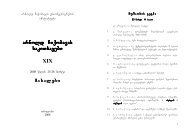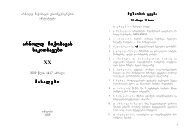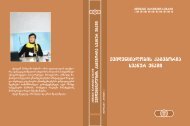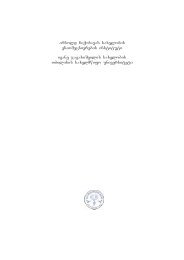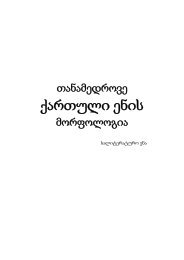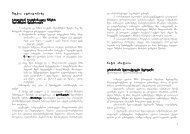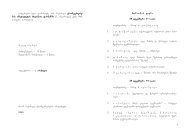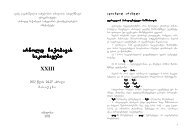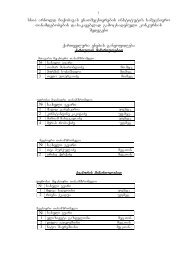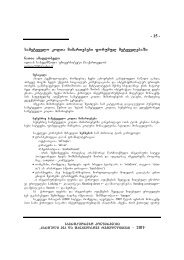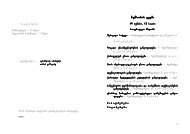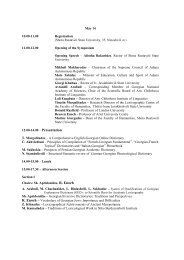5 r. a b a S i a (Tbilisi) bgeraTSesatyvisobis erTi rigisaTvis qarTvelur ...
5 r. a b a S i a (Tbilisi) bgeraTSesatyvisobis erTi rigisaTvis qarTvelur ...
5 r. a b a S i a (Tbilisi) bgeraTSesatyvisobis erTi rigisaTvis qarTvelur ...
You also want an ePaper? Increase the reach of your titles
YUMPU automatically turns print PDFs into web optimized ePapers that Google loves.
It goes without saying that very close collective in which person lives is<br />
his family. In Russian they say «твердый орешек» about a person, who is difficult<br />
to understand and live with.<br />
e.g. Бригада взяла парня. Правда, в отделе кадров<br />
предупреждали: крепкий орешек этот Синяков (Кулешов).<br />
In German phraseology there is a turn «eine harte Nuß», i.e. hard nut,<br />
which means difficult task, difficult position or circumstances.<br />
e.g. Diese Aufgabe ist ja eine harte Nuß (Geyer).<br />
In some occasions when we speak about person, who never falls under<br />
somebody’s influence, who is unsociable, it is said «er ist eine feine Nummer».<br />
e.g. Dieser Emil war aber eine feine Nummer!<br />
In the English language there is a turn «a hard (tough) nut», which can<br />
be used while speaking either about person, who is difficult to cope with, either<br />
about difficult task.<br />
e.g. Withers were a harder nut to crack than he’d thought (Lindsay).<br />
In Lezgian language turn «kevi<br />
q´van<br />
van» (literary «hard stone») is used<br />
while speaking about person with difficult character, who never falls under the<br />
influence of the collective. Here comparison of the person with hard stone is<br />
hidden in the figurative basis.<br />
It is difficult not to pay attention to the person, who stands out of his collective,<br />
differs in his character, views, and habits from surrounding people.<br />
Such a person looks as «white crow» among black crows, or «black sheep»<br />
flock of white sheep. These comparisons are not made up; they exist in the<br />
phraseology of different nations – in many languages person, who stands out of<br />
the environment is called «white crow».<br />
Russian idiom «белая ворона» is close in the semantic meaning to the<br />
following German «ein weißer Rabe» and «ein schwarzes Schaf», English «a<br />
white crow» и «a black sheep», Lezgian «dana<br />
danajiq qvaj Kun» и «tum qawa<br />
awaj<br />
danadi nexir qawurda<br />
awurda» idioms. Idioms «ein weißer Rabe», «a white cow»,<br />
«dana<br />
danajiq qvaj Kun» are mostly used when characteristics is positive, i.e. this<br />
person is better than surrounding people.<br />
E.g. Im Verlag Neues Vaterland zu Berlin ist ein kleines Heft erschienen,<br />
das heißt “Das verlorene Afrika” und ist von Hans Paarsche,<br />
117



